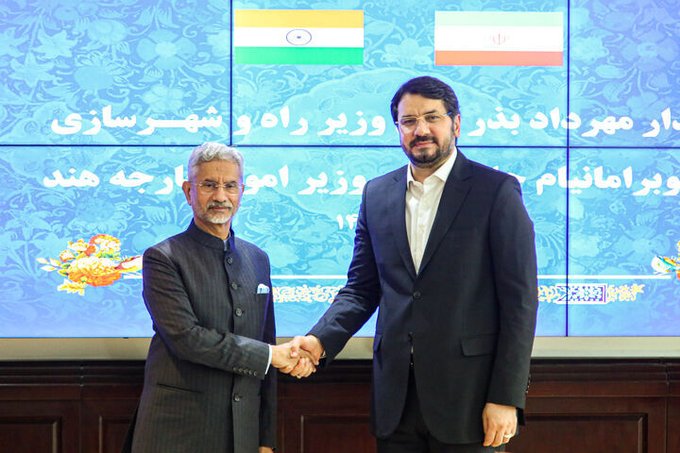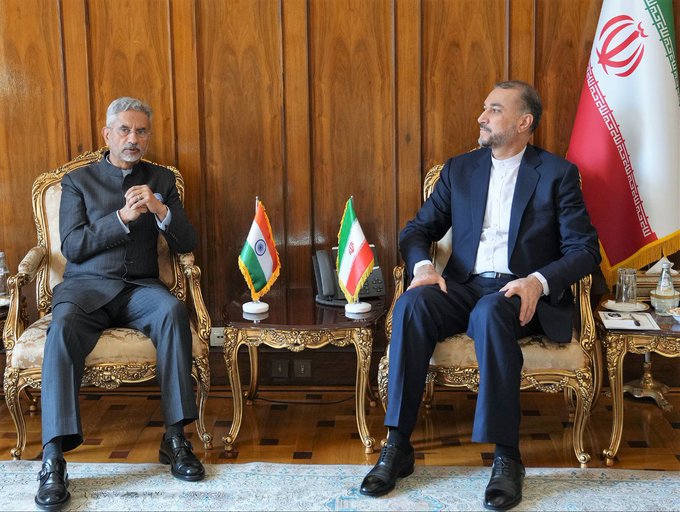Last Updated on January 15, 2024 7:40 pm by INDIAN AWAAZ
Jaishankar’s two-day visit to Iran comes amid a volatile situation in the Middle East due to the Israel-Hamas war and the recent US-led coalition’s attacks on Houthi military targets in Yemen.

AMN / WEB DESK
India’s External Affairs Minister S Jaishankar on Monday exchanged views with top Iranian leaders on bilateral issues, including the Chabahar Port and the International North-South Transport Corridor (INSTC), apart from discussing regional and global developments.
During extensive and fruitful discussions in Tehran, External Affairs Minister S. Jaishankar and Iranian Foreign Minister Dr. Amir Abdullah explored a diverse array of subjects, encompassing bilateral relations, regional connectivity, and global concerns. Mr Jaishankar expressed gratitude for the warm welcome and engaged in a highly productive exchange with Dr. Amir Abdullah, covering various aspects of their countries’ bilateral engagement. Mr. Jaishankar highlighted the regular momentum of high-level interactions, emphasizing the importance of ongoing communication between leaders, as evidenced by recent meetings between Prime Minister Modi and Iranian President Raisi at Johannesburg.
The Ministers focused on political, economic, and cultural aspects in their discussions, with India expressing interest in deepening regional connectivity with Iran. Mr Jaishankar reiterated India’s commitment to projects such as the Chabahar port, emphasizing the need for direct leadership supervision for its success. Cultural ties between the nations were also underlined, with the announcement that Farsi would be included as one of the nine classical languages in India’s new education policy. Discussions delved into the shared cultural, literary, and linguistic bonds, providing a unique foundation for increased exchanges in various fields.
Regional issues took center stage, with both ministers expressing shared concerns about recent events in West Asia. The importance of preventing further escalation of violence and hostilities was emphasized, and Jaishankar reiterated India’s firm stance against terrorism. Discussions included addressing the visible humanitarian crisis, supporting sustainable humanitarian corridors, and India’s contributions to Gaza. On the issue of Palestine, India reaffirmed its support for a two-state solution and called for diplomatic efforts to avoid provocative actions. The Ministers also discussed the increasing threats to maritime commercial traffic in the Indian Ocean, expressing grave concern over attacks near India and their direct impact on India’s energy and economic interests.

”Began my engagements in Tehran by meeting Minister of Roads and Urban Development @mehrdadbazrpash. Detailed and productive discussions on establishing a long-term cooperation framework with respect to Chabahar Port. Also exchanged views on the International North-South Transport Corridor,” the Indian minister said in a social media post on ‘X’.
Iranian news agency IRNA said Jaishankar later had a meeting with Iran’s Foreign Minister Hossein Amirabdollah. The two foreign ministers discussed developing bilateral relations in different fields.
Jaishankar’s two-day visit to Iran comes amid a volatile situation in the Middle East due to the Israel-Hamas war and the recent US-led coalition’s attacks on Houthi military targets in Yemen.
India has made substantial investments in the Chabahar Port in Iran as it provides New Delhi a direct transport link to Afghanistan, bypassing Pakistan. Despite repeated requests by both India and Afghanistan, Pakistan does not permit India to use its territory to send Indian humanitarian and other assistance to the embattled nation.
The International North–South Transport Corridor (INSTC) is a 7,200-km long multi-mode network of ship, rail, and road routes for moving freight between India, Iran, Azerbaijan, Russia, Central Asia and Europe. India is keen on expediting the INSTC project to expand trade with West Asian and Central Asian countries.
